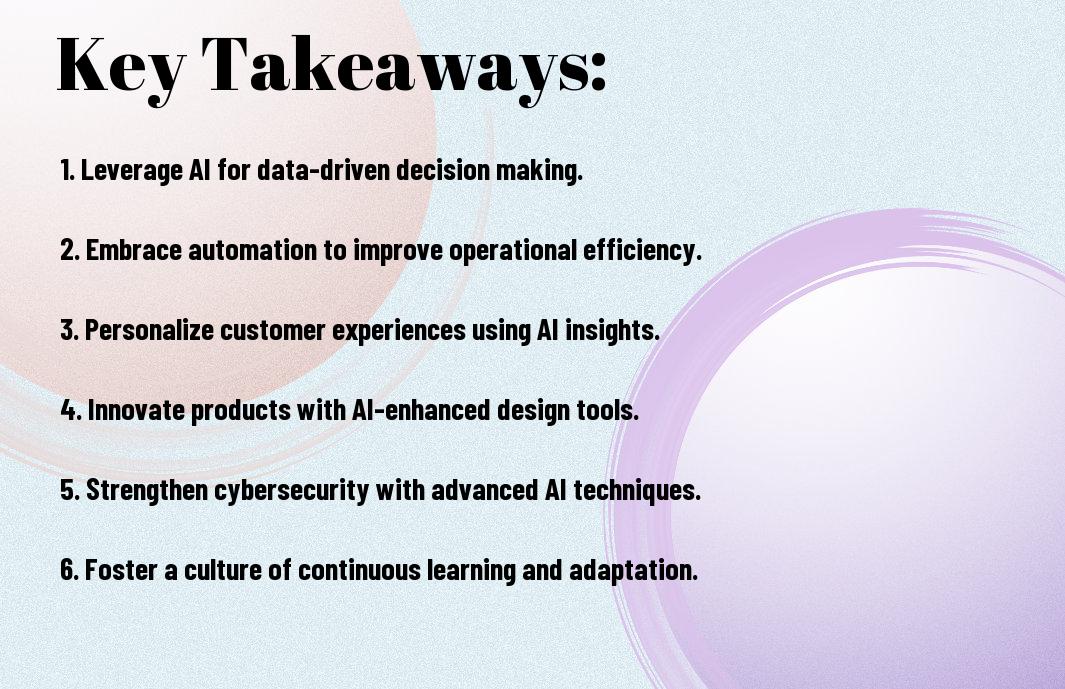As you navigate the ever-changing landscape of business, you’re likely aware that artificial intelligence (AI) is revolutionizing the way companies operate. You’re probably wondering how to leverage AI to drive your success. Your ability to adapt and innovate will be key to staying ahead of the competition. You’ll need to understand how AI can enhance your strategies, streamline operations, and boost profitability. This post will guide you through the process of building a fortune with AI-enhanced strategies.

Key Takeaways:
- Businesses can leverage AI to analyze vast amounts of data, identify patterns, and make informed decisions to stay ahead of the competition and drive growth.
- AI-enhanced strategies can help companies automate routine tasks, streamline operations, and improve efficiency, allowing them to focus on high-value activities and innovate.
- By embracing AI, organizations can develop new business models, create personalized customer experiences, and unlock new revenue streams, ultimately building a strong foundation for long-term success.
The AI Revolution in Business
To stay ahead in the business world, you need to understand the impact of AI on your industry. AI-enhanced strategies can help you build a fortune by leveraging machine learning, natural language processing, and data analytics.
Transformative Technologies
By embracing innovative solutions, you can streamline your operations, improve customer experience, and gain a competitive edge. Your business can benefit from AI-powered tools that automate tasks, provide insights, and drive growth.
Market Disruption Potential
By adopting AI, you can disrupt traditional markets and create new opportunities. Your ability to adapt to AI-driven changes will determine your success in the future business landscape.
In addition, as you consider the market disruption potential of AI, you should think about how it can help you identify new revenue streams, optimize your supply chain, and enhance your decision-making processes. You can use AI to analyze large amounts of data, predict market trends, and make informed decisions that drive your business forward.

Data-Driven Decision Making
While leveraging data is vital for your business, it’s equally important to use it effectively. You can make informed decisions by analyzing data, which helps you stay ahead of the competition and drive growth.
Predictive Analytics
Making use of advanced algorithms, you can forecast future trends and patterns, enabling you to adjust your strategies accordingly. This helps you optimize your business operations and improve overall performance.
Customer Behavior Insights
Between understanding your customers’ needs and preferences, you can develop targeted marketing campaigns that yield better results. You can gain a deeper understanding of your customers by analyzing their behavior and purchasing patterns.
Insights into customer behavior help you identify areas of improvement and opportunities to innovate, allowing you to stay competitive and build a loyal customer base. You can use these insights to personalize your services, improving customer satisfaction and driving long-term growth.
AI-Powered Marketing Strategies
Once again, you will be able to revolutionize your marketing efforts with AI-powered strategies, enabling you to make data-driven decisions and drive business growth.
Personalization at Scale
Around the concept of personalization, you can tailor your marketing messages to individual customers, increasing engagement and loyalty, with AI analyzing customer data and behavior to create targeted campaigns.
Automated Campaign Optimization
Scaling your marketing efforts, you can automate campaign optimization with AI, allowing you to test and refine your marketing strategies in real-time, ensuring maximum ROI.
Another key benefit of automated campaign optimization is that it enables you to respond quickly to changes in the market, adjusting your strategies to stay ahead of the competition, and you can trust AI to analyze vast amounts of data, identifying areas for improvement and providing actionable insights to inform your marketing decisions.
Operational Excellence Through Automation
Despite the challenges of implementing automation, you can achieve operational excellence by streamlining processes and reducing manual errors, allowing your business to run more efficiently and effectively.
Supply Chain Intelligence
Across your organization, you will find opportunities to leverage AI-enhanced strategies, such as predictive analytics, to optimize supply chain management and improve decision-making, enabling your business to stay ahead of the competition.
Resource Allocation Systems
To maximize productivity, you can implement resource allocation systems that utilize AI to analyze your business needs and allocate resources accordingly, ensuring that your operations are running at peak performance.
Also, by utilizing AI-powered resource allocation systems, you can gain valuable insights into your business operations, identifying areas of inefficiency and opportunities for growth, allowing you to make informed decisions to drive your business forward and increase your bottom line.
Building Competitive Moats
Not only will AI-enhanced strategies give you a competitive edge, but they will also help you build a strong foundation for your business. As you explore the possibilities of AI, consider learning more about What’s the Future of AI in Business? to stay ahead of the curve.
Proprietary AI Systems
Along with developing your AI strategy, you’ll need to invest in proprietary AI systems that can help you analyze data and make informed decisions. This will enable you to create a unique value proposition that sets your business apart from the competition.
Talent Acquisition and Development
Across various industries, you’ll need to focus on acquiring and developing talent that can help you implement AI-enhanced strategies. This includes hiring data scientists, AI engineers, and other professionals who can help you build and maintain your AI systems.
Building on your talent acquisition and development efforts, you’ll need to create a culture that fosters innovation and continuous learning. This will enable you to stay up-to-date with the latest AI trends and technologies, and make adjustments to your strategy as needed to ensure your business remains competitive.
Ethical Considerations and Risks
Many businesses are now leveraging AI to drive growth, but you must consider the ethical implications of your actions. As you develop your AI-enhanced strategies, you need to be aware of the potential risks and take steps to mitigate them.
Privacy Concerns
Around the issue of data collection, you should be mindful of how you handle sensitive information. As you implement AI systems, you must ensure that your customers’ privacy is protected and that their data is secure.
Algorithmic Bias Mitigation
Bearing in mind the potential for bias in AI algorithms, you should take steps to address this issue. As you develop your AI systems, you need to consider how bias can impact your decision-making processes.
To effectively mitigate algorithmic bias, you should prioritize transparency and accountability in your AI systems. You can achieve this by regularly auditing your algorithms and implementing diverse and inclusive data sets, which will help you identify and address any biases that may be present, ensuring that your AI-enhanced strategies are fair and unbiased, and ultimately benefiting your business and customers.
To wrap up
So, as you commence on your journey to build a fortune, you will need to harness the power of AI-enhanced strategies. You can learn more about the impact of AI on business by reading Future Of Business: How AI Is Transforming Fortune 500 …, which provides valuable insights into your future success. You will be well-equipped to make informed decisions and stay ahead of the curve in your industry.
FAQ
Q: What role will Artificial Intelligence (AI) play in shaping the future of business, and how can companies leverage AI to build a successful fortune?
A: AI is poised to revolutionize the business landscape by automating processes, enhancing decision-making, and driving innovation. To leverage AI, companies should focus on developing AI-enhanced strategies that integrate machine learning, natural language processing, and data analytics to gain a competitive edge. By embracing AI, businesses can improve operational efficiency, personalize customer experiences, and uncover new revenue streams, ultimately paving the way for building a successful fortune.
Q: How can businesses effectively implement AI-enhanced strategies to drive growth and profitability in a rapidly changing market?
A: To implement AI-enhanced strategies, businesses should start by identifying areas where AI can add the most value, such as customer service, marketing, or supply chain management. They should then invest in AI technologies, such as chatbots, predictive analytics, or robotic process automation, and develop a robust data infrastructure to support AI adoption. Additionally, companies should foster a culture of innovation, encourage experimentation, and provide ongoing training to employees to ensure they have the necessary skills to work effectively with AI systems.
Q: What are the potential risks and challenges associated with adopting AI-enhanced strategies, and how can businesses mitigate them?
A: The adoption of AI-enhanced strategies carries potential risks, such as job displacement, data privacy concerns, and algorithmic bias. To mitigate these risks, businesses should prioritize transparency, accountability, and ethics in their AI development and deployment. They should also invest in employee retraining and upskilling programs to prepare workers for an AI-driven future. Furthermore, companies should establish robust governance frameworks to ensure AI systems are aligned with business values and comply with regulatory requirements.
Q: How can small and medium-sized enterprises (SMEs) compete with larger corporations in adopting AI-enhanced strategies, and what resources are available to support their AI adoption?
A: SMEs can compete with larger corporations by focusing on niche areas where AI can add significant value, such as customer service or marketing. They can also leverage cloud-based AI services, open-source AI platforms, and collaborative partnerships with AI startups or research institutions to access AI technologies and expertise. Additionally, SMEs can tap into government initiatives, industry associations, and non-profit organizations that provide funding, training, and resources to support AI adoption among small businesses.
Q: What skills and expertise do business leaders need to develop to effectively lead their organizations in an AI-driven future, and how can they stay ahead of the curve in terms of AI trends and innovations?
A: Business leaders need to develop a combination of technical, business, and soft skills to effectively lead their organizations in an AI-driven future. They should have a basic understanding of AI concepts, such as machine learning and data analytics, as well as the ability to communicate complex AI ideas to non-technical stakeholders. They should also possess strategic thinking, creativity, and emotional intelligence to drive AI adoption and lead their organizations through digital transformation. To stay ahead of the curve, business leaders should engage in ongoing learning, attend industry conferences, and participate in AI-focused communities and forums to stay informed about the latest AI trends and innovations.



